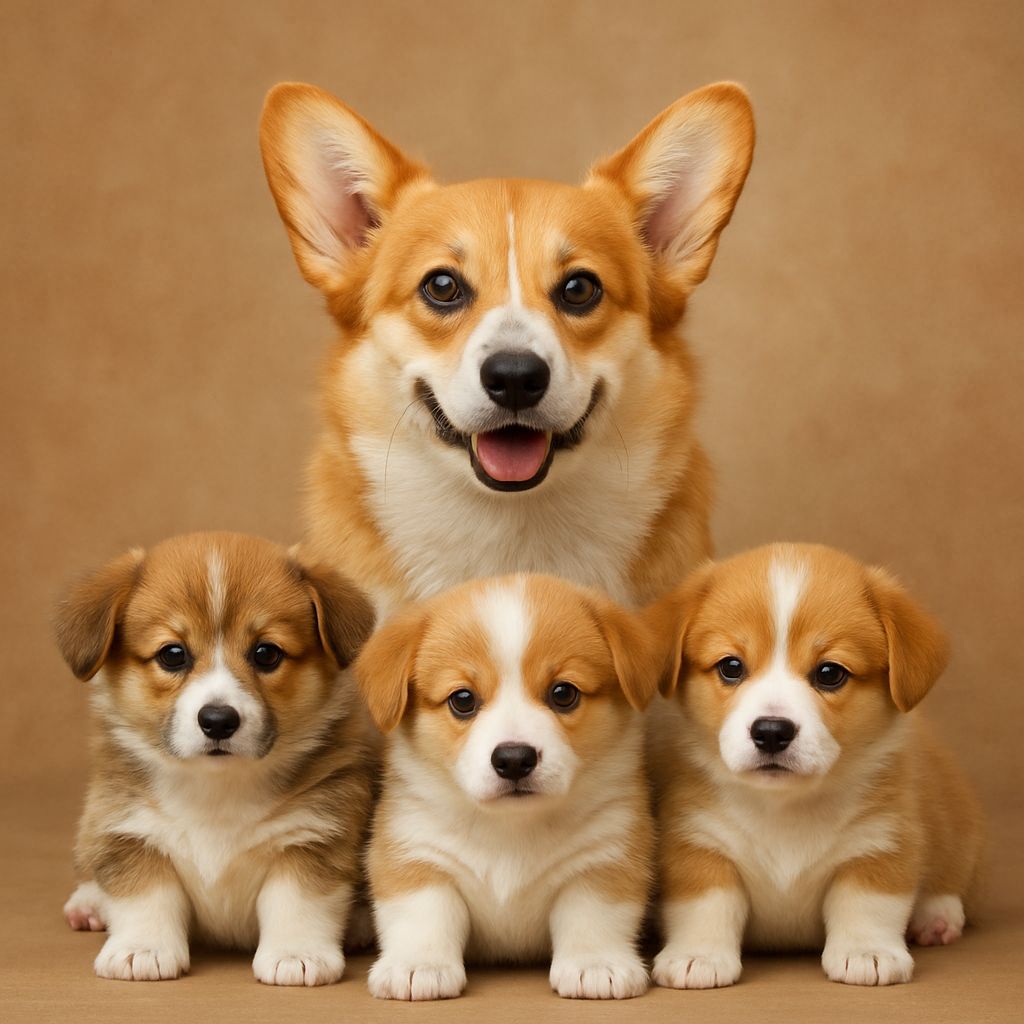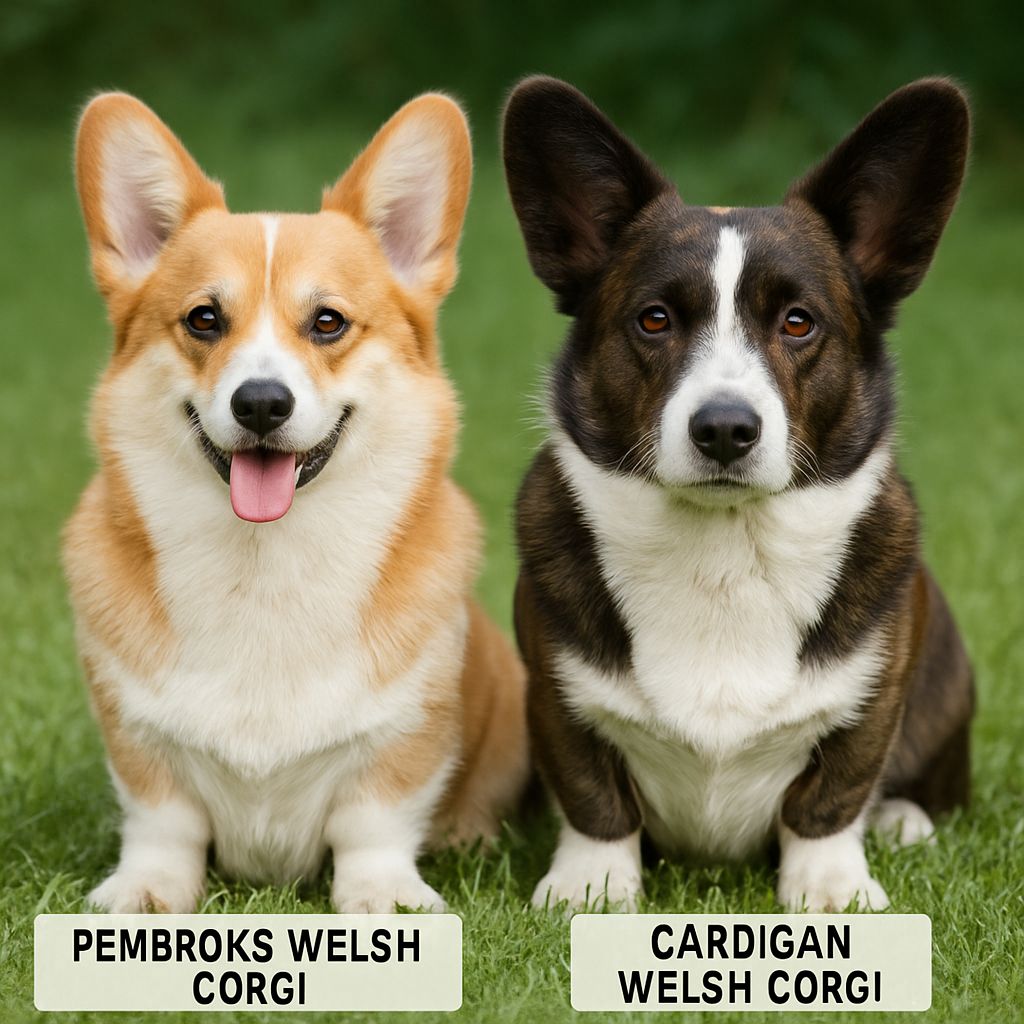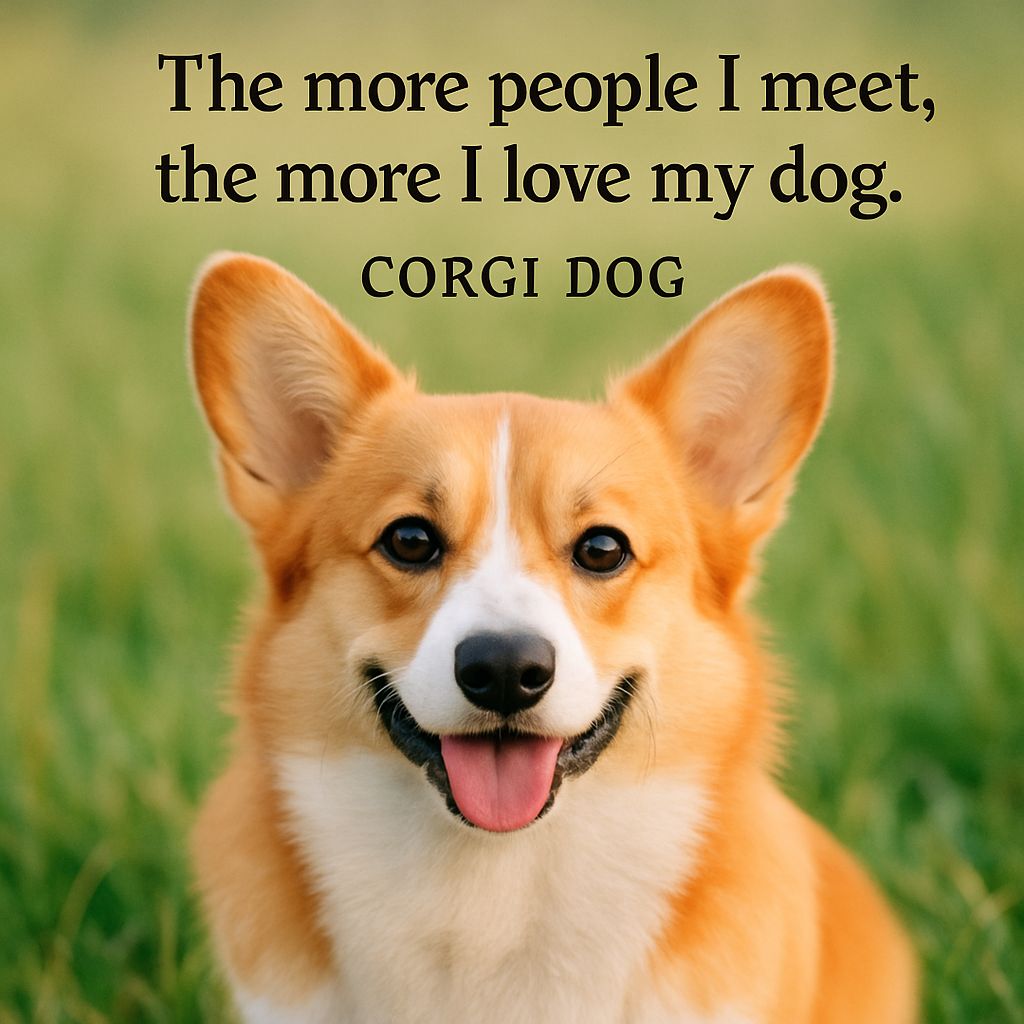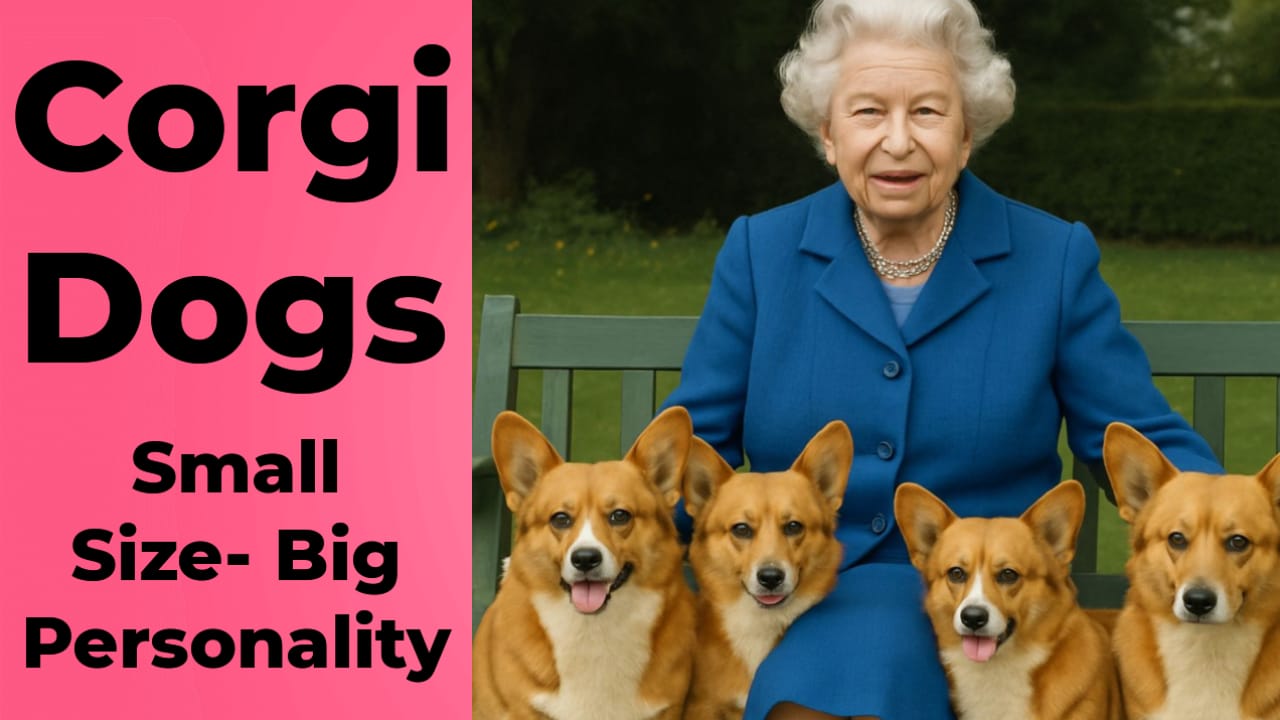What is a Corgi Dog?
Corgi dogs are small herding dogs originating from Wales, United Kingdom. They come in two distinct breeds: the Pembroke Welsh Corgi and the Cardigan Welsh Corgi. Both are known for their intelligence, loyalty, and playful nature. Queen Elizabeth II’s love for Pembroke Corgis made them globally famous, but their unique traits keep them popular among dog lovers.
Corgis are quite the craze globally now, fluffy behinds and all! Their looks clearly win hearts everywhere. Being very sassy with a thousand expressions, the Corgi breeds just had to be internet favorites. The ultimate guide will help you explore all about this sweet dog, from irresistible facts to tried-and-tested tips from every owner, so whether you are an old-time Corgi owner or if you are just curious about the lovely breed, it is all covered here. Today, the Corgis are famous not only for being working dogs but also for their wonderful temperament, loving nature, and silly looks.

Table of Contents
History Of Corgi Dog
Dating back more than 1,000 years in Wales, Corgi dogs were built to be herding dogs. There are essentially two breeds of Welsh Corgi dogs-one Pembroke and one Cardigan. Both breeds are short, compact, and intelligent but speak of a contrasting ancestry. Corgis became more popular last century because Queen Elizabeth II loved them since she was a kid and owned over 30 in her life. This royal connection made Corgis famous worldwide.
Pembroke Welsh Corgi and Cardigan Welsh Corgi

| Main Feature | Pembroke Welsh Corgi | Cardigan Welsh Corgi |
|---|---|---|
| Origin | Pembrokeshire, Wales | Cardiganshire, Wales |
| Tail | Short or naturally bobbed | Long with bushy tail |
| Ears | Smaller, pointed and upright | Larger and more rounded at the tips |
| Body | Shorter and lighter build | Slightly longer and heavier build |
| Temperament | Friendly in nature, outgoing, energetic | Loyal, calm, a bit more reserved |
| Coat | Medium length, less dense | Thicker, more dense double coat |
| Color Variety | Commonly red, sable, fawn, or tri-color | More variety – includes brindle, blue merle, and others |
| Popularity | More famous, especially due to Queen Elizabeth II | Less common, but equally loved by fans |
| Tail Docking (tradition) | Often docked (less common now) | Traditionally kept long |
Both breeds are intelligent, affectionate, and excellent companions, but their appearance and temperament can help you choose the best fit for your lifestyle.
Reasons Why To Choose Corgi Dogs
- Their wiggly butts are hypnotic.
- Corgis have big personalities packed in small bodies.
- They smile—a great deal.
- They cuddle like experts.
- Corgis are smart and easily trained.
- Loyal to the bone.
- Playful well into adulthood.
- Dramatically funny.
- Always alert—perfect watchdogs.
- They get along with kids and other pets.
- Can be adapted to apartment life.
- They love to learn tricks.
- Their herding instinct leads to adorable quirks.
- Corgis dress up well for costumes.
- Corgis are famous for having large personalities in a small package!
Temperament and Personality of Corgis
| Trait | Description |
|---|---|
| Intelligent | Corgi dogs are highly smart and quick learners. They respond well to training. |
| Alertness and Watchful | Naturally protective and make great watchdogs. |
| Friendly Nature | Friendly with family, children, and other pets (if socialized early). |
| Playful & Energetic | Playful and active by nature,need regular exercise to stay happy and healthy. |
| Loving & Affectionate | Very loving and enjoy being close to their humans. |
| Strong Thinkers | Can be a little stubborn due to their strong-willed nature. |
| Vocal | Known to bark, mostly when excited or alerting to something. |
| Herding Instincts | May try to herd people, kids, or other animals by nipping at heels. |
🐶 Pembroke vs. Cardigan Personality
- Pembroke Corgis are generally more sociable and friendly, especially more lively and playful
- Cardigan Corgis are slightly more reserved and laid-back, but no less loyal and friendly.
Both of these breeds need attention, mental stimulation, and to be family members. Without sufficient exercise, they get bored — and a bored Corgi is a naughty one!
🏡 Corgis and Families

Corgis are loyal, loving, and high energydogs that make excellent family pets for most families.But their herding heritage includes some behaviors that need to be understood and managed from the start.
Are Corgis Good with Kids?
Yes — Corgis are generally good with kids! They’re loving and love to join in on the family fun. Their energetic playfulness makes them an excellent fit for energetic kids. But:
- Because of their herding nature, they will often nip at children’s heels when excited or playing.
This can be minimized through early training and socialization. - Supervision is always recommended with small children, especially during rough play.
With training, Corgis may become a child’s loyal and protective friend.
Corgis and Other Pets
Corgis are likely to get on well with other pets, provided they are raised together from puppyhood.
They tend to be great with other dogs, but will try to be the boss because of their assertive personality.
They can get along peacefully with cats if they are introduced correctly.
Their herding behavior will make them chase or attempt to herd small animals,so introducing them slowly is necessary.
Training and proper socialization ensure your Corgi is a well-behaved pack animal in a multiple pet household
Exercise and Other Activities Need
Exercise and other activitities need of Corgi dogs
| Aspect | Details |
|---|---|
| Needs Daily Exercise | Minimum 1 hour per day (split into walks, playtime, and mental games) |
| Regular Walks | Minimum 2 walks per day (20–30 minutes each) |
| Playtime | Loves fetch, tug-of-war, and interactive games |
| Mental Stimulation | Needs puzzle toys, obedience training, or learning new tricks regularly |
| Herding Instinct Outlet | Enjoys agility, herding balls, or structured dog sports |
| Arrange Indoor Activity | Active indoors but still needs outdoor play to burn energy |
| Provide Off-Leash Play | Enjoys free running in safe, fenced areas |
| Exercise Warning | Avoid over-exercising young puppies to protect growing joints |
Note: Corgis may be small, but they are high-energy dogs that thrive on both physical and mental activity. Without enough exercise, they can become bored, barky, or even destructive.
Grooming and Shedding in Corgis
Corgis are known for their thick double coats, which keep them weather-resistant—but also make them heavy shedders. Both Pembroke and Cardigan Welsh Corgis require regular grooming to stay clean, healthy, and comfortable.
| Grooming Aspect | Details |
|---|---|
| Shedding Level | High –mostly during spring and fall “coat blow” seasons |
| Brushing | Weekly 2–3 times (daily during heavy shedding) to clean loose fur |
| Bathing | Once every 4–6 weeks or as needed; avoid over-bathing |
| Coat Type | Having Double coat: a soft undercoat and a longer, coarse outer coat |
| Nail Trimming | Do at every 3–4 weeks to avoid overgrowth and cracking |
| Ear Cleaning | Regular/Weekly check and cleaning to prevent wax build-up or infections |
| Teeth Brushing | At least 2–3 times a week to maintain good oral health |
| Professional Grooming | helpful during seasonal shedding or for deep cleaning |
🐶 Tips for Managing Shedding
- Use a good quality de-shedding tool or slicker brush to reach the undercoat.
- Provide a fortified or balanced diet rich in Omega-3s for healthy skin and coat.
- Regular grooming also helps reduce allergens in the home.
Common Health Issues
Both Pembroke and Cardigan Welsh Corgis are generally healthy, but like all breeds, they are prone to certain health problems—many of which are genetic in nature due to their body structure and breed history.
| Health Issue | Description |
|---|---|
| Hip Dysplasia | A genetic condition where the hip joint doesn’t develop properly; causes pain and arthritis. |
| Degenerative Myelopathy (DM) | A serious, inherited spinal cord disease causing gradual paralysis in older dogs. |
| Intervertebral Disc Disease (IVDD) | Due to their long backs, Corgis are prone to slipped or ruptured discs. |
| Progressive Retinal Atrophy (PRA) | A genetic eye disease leading to gradual blindness. |
| Obesity | Common in Corgis due to their small legs and big appetite; can worsen joint and back issues. |
| Epilepsy | Some Corgis may experience seizures due to inherited epilepsy. |
| Hypothyroidism | A hormonal disorder causing weight gain, lethargy, and skin problems. |
| Von Willebrand’s Disease | A blood clotting disorder (genetic) that may cause excessive bleeding. |
| Cataracts | Clouding of the eye lens, which can lead to impaired vision or blindness. |
| Allergies (skin or food) | May cause itching, redness, and digestive issues; can be managed with diet and care. |
🩺 Health Tips for Corgi Owners
- Maintain a schedule for regular vet check-ups.
- Maintain your Corgi dog at a healthy weight to avoid strain on their back and joints.
- Ask your breeder for health screening tests (especially for DM, PRA, and hip dysplasia).
- Provide joint supplements and a balanced diet if recommended by your vet.
With proper care, Corgis can live long, happy lives—typically 12 to 15 years. Early detection and preventive care are key to managing these conditions.
🥗 Diet and Nutrition Tips for Corgis
Corgis are small but active dogs with big appetites. Because they are prone to obesity, it’s important to give them a balanced, portion-controlled diet that supports their energy levels and overall health.
| Nutrition Aspect | Details |
|---|---|
| Daily Food Quantity | About ¾ to 1.5 cups of high-quality dry food per day (split into 2 meals) |
| Protein | It should be a main ingredient because it supports muscle health and strength |
| Fat | Required for energy, but control levels to avoid weight gain |
| Fiber | Helps digestion; try to choose foods with healthy grains or veggies |
| Omega-3 & 6 Fatty Acids | Healthy for skin, coat, and joint health |
| Avoid Overfeeding | Use a measuring cup; avoid free feeding |
| Treats | Try to limit treats to no more than 10% of daily calorie intake |
| Fresh Water | Always provide clean, fresh water |
| Human Foods to Avoid | Chocolate, grapes, onions, garlic, alcohol, cooked bones, xylitol, etc. |
| Puppy vs. Adult Diet | For puppies more calories and nutrients required ; switch to adult food around 11-12 months |
🦴 Bonus Tips
- Always try to use a slow feeder bowl if your Corgi eats too fast.
- Monitor your dog’s weight and body condition regularly.
- Consult to your vet before adding supplements or switching diets.
- If you are a vegan and want your dog to be vegan then read our article on vegan dog.
🎓 Training Tips for Corgi Dogs
Corgis are intelligent, eager to please, and quick learners, but they can also be stubborn and independent. With the right approach, training a Corgi can be both effective and fun!
| Training Tip | Details |
|---|---|
| Start Early | Start training and socialization during puppyhood (8–12 weeks) |
| Use Positive Reinforcement | Give reward with treats, praise, or play when your Corgi does something trained by you |
| Be Consistent | Try to use the same commands and rules every day to avoid confusion |
| Keep Sessions Short | 5–10 minute sessions work best to hold their attention |
| Focus on Basic Commands | Teach sit, stay, come, down, and leash walking first |
| Use Mental Stimulation | Add puzzle toys and trick training to challenge their smart brains |
| Curb Nipping Behavior | Redirect their herding nips with toys and consistent “no bite” commands |
| Leash Training is Essential | Corgis can be excitable—early leash manners prevent pulling and lunging |
| Avoid Harsh Methods | Corgis don’t respond well to yelling or punishment—stay calm and firm |
| Socialize with People & Dogs | Expose them to different environments, pets, and people from a young age |
Fun Facts About Corgis
- 🐉 Mythical Origins: According to Welsh legend, Corgis were the fairy steeds of woodland elves and fairies. The markings on their backs were said to be saddle outlines from fairy riders!
- 👑 Royal Favorite: Queen Elizabeth II was a lifelong fan of Pembroke Welsh Corgis and owned more than 30 Corgis during her reign.
- 🐾 Built for Herding: Despite their short legs, Corgis were bred to herd cattle. Their low height helps them dodge kicks from livestock while nipping at their heels.
- 🐕🦺 Two Breeds, One Heart: There are two types of Corgis—Pembroke Welsh and Cardigan Welsh—with different tails, body shapes, and ancestry.
- 🎓 Super Smart: Corgis rank among the top 15 smartest dog breeds. They learn quickly and love tasks that challenge their minds.
- 🐶 Big Bark, Small Dog: Don’t let their size fool you—Corgis have a loud, alert bark and make great watchdogs!
- 🎭 Internet Stars: Corgis are a favorite on social media for their wiggly butts, smiling faces, and playful antics.
- 🧽 “Corgi Flop”: They’re famous for the adorable “sploot”—when they lie flat with their back legs stretched out behind them.
Corgis are truly a blend of brains, charm, and cuteness, which makes them one of the most beloved dog breeds worldwide!
Common Myths Debunked
❌🐶 Common Myths About Corgi Dogs– Debunked
| Myth | Truth |
|---|---|
| Corgis are lazy lap dogs. | Infact Corgis are active herding dogs that need regular exercise and mental stimulation. |
| They don’t shed much because they’re small. | Corgis are heavy shedders due to their thick double coats. |
| Corgis don’t need training—they’re too cute! | Even cuteness can’t replace discipline—Corgis need firm, consistent training. |
| They’re good for apartment living without walks. | Corgis can live in apartments but require daily activity to stay happy. |
| Corgis are always friendly with everyone. | While sociable, Corgis can be protective or aloof with strangers if not socialized well. |
| Their short legs mean they don’t run fast. | Surprisingly, Corgis are fast and agile, built for herding and quick movement. |
| They’re the same breed. | Nope! Pembroke and Cardigan Corgis are two separate breeds with unique traits. |
✅ Reality
While Corgis are charming and funny, they’re also smart, energetic, and hardworking dogs. Knowing the truth behind the myths helps ensure a happier, healthier life for your Corgi!
Why Corgis Are Internet Stars
Corgis have taken the internet by storm—and for good reason! These short-legged, fluffy-tailed charmers have a unique blend of personality, looks, and humor that makes them perfect for viral fame.
| Reason | Why Everyone Loves It |
|---|---|
| Adorable Appearance | Big ears, short legs, round bums, and expressive faces—cuteness overload! |
| The Famous “Corgi Sploot” | Their signature pose, lying flat with legs stretched behind, is super photogenic. |
| Playful Personality | Always ready for fun, their silly antics make for endless entertainment. |
| Wiggly Walks and Wiggle-Butts | Their unique walk and constant tail wagging are hilarious and heart-melting. |
| Social Media Friendly | They pose well for photos, wear costumes, and react expressively on camera. |
| Queen Elizabeth’s Dogs | Their royal connection adds to their fame and fan following. |
| Viral Videos and Memes | Corgis have starred in countless videos, TikToks, GIFs, and dog memes. |
Celebrities with Corgi Dogs

| No. | Celebrity Name | Nationality | Corgi Name(s) |
|---|---|---|---|
| 1 | Queen Elizabeth II | British | Susan, Dookie, Jane, Crackers, Sugar, Honey, Heather, Tiny, Bushy, Foxy, Brush, Willow, Holly, Monty, Candy, Muick, Fergus, Sandy |
| 2 | Jennifer Aniston | American | Norman (Welsh corgi-terrier mix) |
| 3 | Julie Andrews | British | Humpty Dumpty |
| 4 | Kiefer Sutherland | Canadian | Mr. Peterson |
| 5 | Ava Gardner | American | Rags, others (names not specified) |
| 6 | Alton Brown | American | Sparky, Daisy |
| 7 | Betty White | American | Bandit (ownership not fully confirmed) |
| 8 | Jerry Brown | American | Sutter Brown, Colusa (corgi-border collie mix) |
| 9 | Stephen King | American | Marlowe, Molly (“The Thing of Evil”) |
| 10 | Queen Elizabeth The Queen Mother | British | Crackers, Whisky, Sherry |
| 11 | Princess Margaret | British | Johnny, Pippin |
| 12 | Prince Charles (now King Charles III) | British | Sugar (nursery pet) |
| 13 | Princess Anne | British | Sugar (shared with Prince Charles) |
| 14 | Prince Andrew | British | Muick, Fergus, Sandy |
| 15 | Sarah Ferguson | British | Muick, Sandy |
| 16 | Deepika Padukone | Indian | Not named (corgi ownership mentioned) |
| 17 | Shraddha Kapoor | Indian | Not named (corgi ownership mentioned) |
Cost of Owning a Corgi Dog (Pembroke and Cardigan)
| Cost Category | Pembroke Welsh Corgi (USD) | Pembroke Welsh Corgi (INR) | Cardigan Welsh Corgi (USD) | Cardigan Welsh Corgi (INR) | Notes |
|---|---|---|---|---|---|
| Purchase Price (Puppy) | $700–$2,200 | ₹59,000–₹1,85,000 | $1,200–$1,800 | ₹1,01,000–₹1,51,000 | Pembroke: Varies by breeder, pedigree, color. Cardigan: Rarer, slightly higher cost. Show-quality Pembrokes can reach $3,500 (₹2,94,000). |
| Adoption Fee (Rescue/Shelter) | $250–$600 | ₹21,000–₹50,000 | $250–$600 | ₹21,000–₹50,000 | Adoption is cheaper, covers vaccinations, spaying/neutering. Rare to find purebred Cardigans in shelters. |
| Monthly Feeding Cost | $30–$45 | ₹2,500–₹3,800 | $30–$50 | ₹2,500–₹4,200 | Cardigans may eat slightly more due to larger size. Raw diets increase costs to $200/month (₹16,800). |
| Monthly Grooming Cost | $40–$75 | ₹3,400–₹6,300 | $40–$80 | ₹3,400–₹6,700 | Cardigans’ thicker coats may require more grooming. Includes brushing, baths, nail trims. |
| Monthly Training Cost | $50–$150 (optional) | ₹4,200–₹12,600 | $50–$150 (optional) | ₹4,200–₹12,600 | Professional training for obedience/agility. Pembrokes are easier to train; Cardigans may need more sessions. |
| Monthly Vet/Health Care | $25–$90 (with insurance) | ₹2,100–₹7,600 | $25–$90 (with insurance) | ₹2,100–₹7,600 | Includes checkups, vaccinations. Insurance varies by age, health. |
| First-Year Medical Costs | $200–$500 | ₹16,800–₹42,000 | $200–$500 | ₹16,800–₹42,000 | Vaccinations, spaying/neutering, microchipping. Costs similar for both breeds. |
| Initial Supplies (One-Time) | $100–$800 | ₹8,400–₹67,200 | $100–$800 | ₹8,400–₹67,200 | Beds, bowls, leashes, toys. Luxury items increase costs. |
| Lifetime Cost (12–15 Years) | $15,000–$20,000 | ₹12,61,000–₹16,82,000 | $15,500–$20,500 | ₹13,03,000–₹17,24,000 | Includes purchase, food, grooming, vet care. Cardigans may have slightly higher grooming costs. |
Is a Corgi Right for You?
| Trait | Pembroke Welsh Corgi | Cardigan Welsh Corgi |
|---|---|---|
| Temperament | Friendly, outgoing, playful, bold, confident, and often described as “big dog energy” in a small body. | Affectionate, loyal, intelligent, but slightly more reserved and cautious than Pembrokes. |
| Energy Level | High energy, loves to play and work, requires regular exercise (30–60 minutes daily). | Moderate to high energy, enjoys activity but can be less intense than Pembrokes. |
| Sociability | Very social, loves people, good with kids and other pets when socialized early. | Social but more selective, may be wary of strangers, good with family and known pets. |
| Intelligence | Highly intelligent, quick learners, eager to please, excel in training and tasks. | Highly intelligent, slightly more independent, may take longer to train due to caution. |
| Protectiveness | Protective, will bark to alert, but not overly aggressive; good watchdogs. | More protective, territorial, and vocal; stronger guarding instincts than Pembrokes. |
| Trainability | Very trainable, responds well to positive reinforcement, loves to please owners. | Trainable but more independent, may need consistent training to overcome stubbornness. |
| Playfulness | Extremely playful, enjoys games like fetch, thrives on interaction and fun activities. | Playful but slightly less exuberant, enjoys activities but may prefer calmer play. |
| Affection Level | Very affectionate, loves being close to family, often seeks attention and cuddles. | Affectionate but more reserved, bonds deeply with family but less overtly cuddly. |
| Adaptability | Adapts well to various environments (apartments or homes) if exercise needs are met. | Adaptable but prefers space to roam, less suited to small apartments than Pembrokes. |
| Vocal Tendencies | Vocal, barks to alert or when excited, may need training to manage excessive barking. | Very vocal, barks more frequently, especially when guarding or sensing strangers. |
Endnote
Corgis are friendly, smart dogs suited for energetic, committed owners who will exercise, groom, and train them. Pembrokes are appropriate for social, city families, and Cardigans for those with room and tolerance for their shy nature. They’re not for sedentary, busy, or quiet-preferring owners due to high energy, shedding, and barking. Assess your lifestyle to ensure a corgi’s needs align with your capabilities.Determining whether a corgi is the best dog for you will be a matter of your lifestyle, interests, and capability to provide the needs of the breed.

Most Frequently Asked Questions About Corgi Dogs
| Question | Answer | Remember |
|---|---|---|
| What are the differences between Pembroke and Cardigan Corgis? | Pembrokes are smaller (22–30 lbs), have docked or no tails, pointed ears, and are outgoing. Cardigans are larger (25–38 lbs), have long tails, rounded ears, and are more reserved. | Pembrokes are more popular (e.g., Queen Elizabeth II’s choice); Cardigans are rarer. |
| How much do Corgis cost? | Purchase: $700–$2,200 (₹59,000–₹1,85,000) for Pembrokes; $1,200–$1,800 (₹1,01,000–₹1,51,000) for Cardigans. Monthly costs: $145–$360 (₹12,200–₹30,300) for food, grooming, vet care. | Costs vary by breeder, location (higher in India), and pedigree. Adoption is cheaper ($250–$600). |
| Are Corgis good family pets? | Yes, both are affectionate, playful, and good with kids/pets if socialized. Pembrokes are more social; Cardigans are protective. They may nip at heels due to herding instincts. | Ideal for active families; not suited for homes with very young kids without training. |
| How much exercise do Corgis need? | 30–60 minutes daily (walks, play, agility). Pembrokes are high-energy; Cardigans are slightly less active. | Prevents obesity, supports mental health. Lack of exercise can lead to barking or chewing. |
| Do Corgis shed a lot? | Yes, both shed heavily, especially in spring/fall. Weekly brushing (daily during shedding) is needed. | Not hypoallergenic; unsuitable for allergy sufferers. |
| Are Corgis easy to train? | Pembrokes are eager to please, highly trainable. Cardigans are intelligent but more independent, needing consistent training. | Early socialization prevents herding behaviors like nipping. |
| What is the lifespan of a Corgi? | 12–15 years for both breeds, with proper care. | Regular vet checkups help manage health issues like hip dysplasia. |
| Are Corgis prone to health issues? | Yes, both face hip/elbow dysplasia, eye disorders, degenerative myelopathy. Pembrokes may have cardiac issues or von Willebrand’s disease. | Weight control is crucial due to long backs. |
| Can Corgis live in apartments? | Pembrokes adapt well to apartments with enough exercise. Cardigans prefer more space but can adjust. | Daily activity is key to prevent boredom or barking. |
| Why are Corgis so popular? | Their charm, intelligence, and royal association (e.g., Queen Elizabeth II’s 30+ Pembrokes) boost popularity. Pembrokes rank 11th in AKC popularity; Cardigans 68th. | Social media and celebrity owners (e.g., Deepika Padukone) add to appeal. |
